- Home
- P J Parrish
An Unquiet Grave (Louis Kincaid Mysteries) Page 15
An Unquiet Grave (Louis Kincaid Mysteries) Read online
Page 15
“Mrs. Stottlemyer?” he asked.
“Yes,” she said warily.
When he produced the police ID, her face crumbled inward and the word came out in one long exhalation. “Sharon,” she said.
“May I come in, ma’am?” Louis asked.
She nodded and held out the storm door. It was a small living room, lamps lit against the afternoon gloom, a big black dog lying in front of a low-burning fire. Mrs. Stottlemyer motioned for Louis to take the sofa and she went to a worn wing chair, setting aside a pile of blue yarn and knitting needles.
“Have you found my daughter?” she asked. Her voice was soft but firm, and Louis had the feeling she already knew that her daughter was dead.
“We think so,” Louis said. “We’ll need dental records to be sure.”
The woman’s eyes were fixed on Louis. “Then Sharon is dead.”
“We found a body in a shallow grave,” Louis said. “There was no identification, just this ring.” He held it out the evidence bag and Mrs. Stottlemyer took it. She picked up the glasses on the cord around her neck and put them on to look at the ring. After a few seconds, her hand closed around the plastic bag.
“Where did you find her?” she asked.
“On the grounds of Hidden Lake Hospital.”
Mrs. Stottlemyer closed her eyes. “Oh my God.”
Louis gave her a minute, sensing she was remembering something, or making some connection between her daughter and the hospital. One that was painful.
“She . . . she said something a few weeks before she disappeared,” Mrs. Stottlemyer said. “I didn’t think anything of it at the time, but now . . .”
“What was it, Mrs. Stottlemyer?”
Her eyes came to Louis. “She asked me if I ever got sad.”
“Sad?”
She nodded. “I told her that everyone gets sad sometimes. But that being sad was nothing more than a mood and that . . .” Mrs. Stottlemyer drew a thick breath. “And that all she needed to do was think positive thoughts and stay busy.”
Louis looked down. Mrs. Stottlemyer’s soft sobs started to fill the small living room. “Mrs. Stottlemyer,” he said, “do you have someone you can call to stay with you?”
“My husband will be home soon,” she said. “And I have a friend next door.”
Louis stood up. Mrs. Stottlemyer looked at him and her hand came up, holding the evidence bag. “Can I have her ring back?”
“Not yet,” he said. “But we’ll return it to you when we can.”
She handed the bag over. “I’m so sorry,” he said.
She didn’t reply, just accompanied him to the door and closed it softly behind him. Louis headed down the narrow walk to his car. As he opened the car door, he glanced over his shoulder at a group of small children playing in front of a bright blue house a few doors away.
Two of the kids were chasing each other, another was up in a tree, a fourth was wrestling with a shaggy brown dog, and a fifth was blowing bubbles that disappeared quickly into the icy air.
CHAPTER 21
The drive back from Napoleon gave him plenty of time to think. But everything was scattered, his thoughts ricocheting between Sharon Stottlemyer, Rebecca Gruber, and Charlie Oberon. Every instinct was telling him Charlie had nothing to do with either woman’s death. Yet there was this small part of him—a part he didn’t want to acknowledge—that wanted to believe that someone like Charlie could kill.
What had Dr. Seraphin said? The line between what is real and what is not is very thin. Sometimes it is even invisible.
He was thinking of Phillip now. Thinking that Phillip’s hold on reality wasn’t very good right now. He had attacked Rodney DeFoe. Not that the bastard didn’t deserve it. But still, Phillip was showing every sign that he was coming apart. And Frances . . . he didn’t even want to think about what all this was doing to her.
It started to rain. He switched on the wipers and then upped the heater a notch. Right now, all he wanted to do was go home and knock down enough Heinekens to numb out for a couple of hours.
Through the blur of the wipers, a sign caught his eyes. He had passed Spera’s place.
There was no excuse for not going back and finding out if Spera had any information about Claudia being cremated. He swung into a driveway and turned around.
Spera was standing by a truck backed up to the tent. The truck was an old U-Haul painted over white with red lettering, SPERA & SONS EXCAVATIONS, on the side. Spera was wearing a yellow rain slicker and stopped to wait as Louis ran from the car through the pelting rain. Spera motioned him back inside the tent.
“Lousy weather,” Spera muttered.
Louis nodded, wiping his face. He noticed the open back of the truck. Stacked inside were the cans from the Hidden Lake mortuary.
“Is this all of them?” Louis asked.
“Yup. The ones we found names on are over there,”
Spera said, pointing back in the tent.
Louis turned and saw the table where about a hundred of the corroded copper cans were carefully lined up. He went over to the table, his eyes scanning the labels.
“She’s not there,” Spera said, coming up behind him.
Louis’s eyes went back out to the truck.
“The ones still on the truck have no labels at all,” Spera said.
Louis looked back at the cans. He leaned closer. There were numbers stamped on the tops. He hadn’t seen them the first time in the darkness of the mortuary storeroom. He turned to Spera. “What about these numbers?” he asked.
Spera shrugged. “I was hoping it was a numbering system of some kind, but I can’t find anything that matches anything in all the records the hospital folks gave me.”
“You’re sure?” Louis asked. “Maybe they’re—”
“Look, Mr. Kincaid,” Spera interrupted. “I know you want to find your loved one, but I got a job to finish here, and things are just one big mess right now.”
There was more than a hint of exasperation in Spera’s voice. “I got a bunch of strange bones with no casket,” he went on, “and a bunch of rusty cans with no names. I got the cops telling me I can’t do any more digging in the cemetery because now it might be a crime scene. I got a developer calling me every day wanting to know when I’m going to be finished. I got reporters nosing around.”
He stopped just long enough to pull in a breath. “And now I got this DeFoe guy coming around.”
“Rodney DeFoe came here?” Louis asked.
“Yeah, Rodney, that was his name.” Spera shook his head. “He came by two days ago wanting to know where your friend Mr. Lawrence lived.”
“You told him?”
“Not me. I wasn’t here. But he told my son he was an old family friend of Mr. Lawrence and wanted to get in touch, so Andy looked up the address.”
Louis suppressed a sigh. Well, that explained how Rodney got to Phillip.
Spera was shaking his head. “Kind of funny, don’t you think. First the guy wants nothing to do with his sister’s remains and now he tells Andy that if we find her he’s the only one we should call.”
Louis thought about what Rodney had told Phillip yesterday: She’s not your problem. Mother and I have decided to take care of it.
Louis’s eyes swept over the tent, to the lines of cans, back to the muddy caskets stacked like cordwood. The white coffin that Phillip had bought for Claudia was still sitting alone on a table in the corner covered with plastic. The rain was whipping the flaps of the tent, bringing the swirling smell of dead earth to his nostrils.
She’s not your problem. Then why in hell did he feel like she was?
“Hey, you okay?”
Louis looked at Spera. “Yeah. I just don’t know where to go next with any of this.”
Spera pursed his lips. “Hold on.” He ducked out into the rain and pulled down the back of the truck and locked it. “Come on inside and let me get you some coffee,” he said.
Louis followed him through the rain and into the office.
Spera shook out of the slicker and went into the bathroom, tossing a towel at Louis when he came back out. “Have a seat while I make a fresh pot.”
Louis rubbed his face dry with the towel and wandered over to the bulletin board where the plans and diagrams of Hidden Lake were displayed. There was a new one posted, a copy of the grave plot map that Spera had shown him out in the cemetery yesterday.
About an eighth of the cemetery plots were shaded black, the rest left blank. The black ones were all toward the back of the cemetery where the bones had been found, except for a handful scattered throughout.
“Are these black ones the graves you’ve already dug up?” Louis asked, turning to Spera.
“Yeah,” Spera said, coming out of the bathroom with a pot of water. “We started at the back so access would be easier as we went along. Except for the ones we dug up first because families asked for the remains.”
“Where is Donald Lee Becker buried?” Louis asked.
Spera turned, a bag of coffee grounds in his hand. “Why are you asking about him?”
“I don’t know,” Louis said quietly, still looking at the map.
Spera set the coffee brewing and came over to Louis. He pointed a grimy finger at a plot in the far bottom corner. “This is him. I’m not going to get to him for weeks yet at this rate.”
“You sure that’s him?”
“Sure I’m sure. I looked him up not more than an hour ago.”
“Why?”
“Some reporter was here asking me about him.”
“Was his name Delp?”
Spera went back to the coffee machine. “Yeah, you know him?”
“Unfortunately.” Louis was still looking at the black plots. “You didn’t tell him, did you?”
“Hell no. How do you take your coffee?”
“Black, lots of sugar.”
Louis came over to the desk where Spera had set out a Garfield ceramic mug and a pile of Sweet n’ Low. Louis took a seat and stirred in the sweeteners.
“That Delp guy was asking me about you, too,” Spera said, sitting down behind the desk.
“He wanted to know what you were doing here.”
“What did you tell him?”
“That it wasn’t any of my business. I’m just the lowly grave digger. I’m just here for comic relief in this little drama.”
Louis smiled.
Spera was toying with his coffee mug. “What are you really doing here, Mr. Kincaid?”
“I’m just trying to find Claudia DeFoe,” Louis said.
“Was that her bones we came across?”
Louis shook his head slowly.
“That reporter thinks Becker is alive,” Spera said. “He thinks Becker killed the nurse they found last week.”
Louis picked up the mug and took a drink of coffee.
“I remember when Becker was here,” Spera said. “Everyone around here was talking about it, scared he’d escape. And rumor was he didn’t really die, that he really did escape and the hospital just said he died to calm the local folks down.”
Louis looked up at Spera. “Don’t tell me you believe he’s still alive.”
Spera leaned back in his chair, shaking his head. “If you’d asked me that a week ago, I’d say you were crazy. But with all that’s going on, I’m almost ready to believe anything is possible in that place.”
Louis’s eyes went back to the wall map of the cemetery plots. Spera was quiet for a moment, then he disappeared into the back room and returned with two tubes of rolled paper and a set of stapled papers.
“What’s that?” Louis asked.
“A copy of the cemetery layout, a map of the hospital, and the log sheet of names of who’s in what plot.”
Louis was confused.
Spera gave a sad shake of his head. “This whole job is starting to get to me,” he said. “All I want is for it to be over with. It’s my job to put these poor souls to rest, but things have gotten so messed up, I can’t even do that.”
Louis’s gaze dropped to the papers Spera was holding out. “I don’t know how I can help you.”
“I don’t know either,” Spera said. “I got a feeling no one is going to be at rest until your lady Claudia is. So take a look at these. Maybe it will help, maybe it won’t.”
The rain had turned to sleet by the time Louis pulled out of Spera’s place, and as he turned east, he found himself stuck behind a slow-moving semi. He was only doing about thirty when he rounded the last curve out of the Irish Hills and saw the rusted Civic in the parking lot of the Sand Lake Inn.
He pulled into the muddy lot, facing the large front window. Through the swipe of the wipers, he spotted Delp’s red-tipped spike hair. He went inside.
Delp was sitting at the counter and looked over when he heard the door.
“Well, well, look what the wind blew in,” he said, then swung back on his stool to take a drink of his beer.
Louis went to the counter and stood directly over the reporter.
“Hey, you’re dripping on me, dude.”
“I’m going to do more than that if you don’t knock it off,” Louis said.
Delp leaned back, holding up his hands. “Whoa. What’d I do now?”
“You were bugging Spera, and I’m getting tired of you bugging people,” Louis said. “And if you got a question about me, you ask me.”
Delp just stared at him for a moment, then nodded toward the empty stool next to him. “Fair enough. Sit down. What you drink? I’m buying.”
Louis hesitated, glancing around. The place was one big room backed by an old-fashioned soda fountain counter and a scattering of tables covered with red-checked tablecloths. Back when U.S. 12 had been the major highway from Detroit to Chicago, the place had probably been humming with hungry travelers. It reminded Louis of roadside diners he had seen in the South, places where the cars didn’t stop anymore but the slow ebb and flow of life kept going.
Louis slid onto the stool just as the waitress set a plate down in front of Delp.
“What’s that?” Louis asked.
“Liver and onions.”
Louis grimaced even as his rumbling stomach was telling him that it didn’t smell half bad. When the waitress returned, he ordered a hot roast beef sandwich and a beer.
Delp was wolfing down his food but finally came up for air. “All right then,” he said, “if I ask you a straight question, you going to give me a straight answer?”
“Depends,” Louis said.
Delp wiped his face with a paper napkin. “So what are you doing here?”
Louis took a swig of beer to buy time before he answered. It was probably just a matter of time before Delp found out he was helping Dalum. And there was a good chance Delp would also find out about Claudia, and the last thing he needed was Delp showing up on the Lawrences’ doorstep.
The waitress brought his food. Louis took two big forkfuls of the gravy-covered sandwich before he spoke. “Look, if I tell you why I’m here, I want your word you won’t write about it.”
Delp shook his head. “You know I can’t promise that.”
“It’s got to do with my foster father, something personal.”
“You’ve got a foster father?”
Louis ignored him. “I swear, Delp, if you so much as make one phone call to his house, I’ll break your goddamn neck.”
“Little drastic, don’t you think?”
“Not at all.”
“Okay, okay. You got my word.”
Louis told Delp about his search for Claudia’s remains, giving only enough details to be convincing. When he was finished, Delp was shaking his head.
“What’s the matter?” Louis asked.
“I don’t know if I can keep that promise, man. That is a helluva story.”
“Look, you weasel—”
“If your missing woman was murdered by my man Becker, then she’s part of my story.”
Louis just stared at him.
“Come on,” Delp said. “Don’t tell me that didn�
��t already cross your mind.”
Louis looked away, down at his roast beef sandwich. He picked up a fork and took a bite, mainly because he didn’t want to look at Delp.
“All right, when was your missing woman in Hidden Lake?” Delp asked.
“She was committed in 1951 and died there in 1972,” Louis said.
“Becker was there from 1963 to 1980.”
Louis was quiet, pushing the mashed potatoes around with his fork. He wasn’t about to tell Delp that Claudia had been confined to E Building, just one floor below Becker.
“And if Becker killed a patient, don’t you think the hospital just might want to keep that little fact quiet?” Delp went on. “Don’t you think they might even accidently misplace said patient’s body just in case someone ever asked?”
Louis pushed his plate away. In the mirror behind the counter, he could see his and Delp’s reflections.
“Quid pro quo, Kincaid,” Delp said.
Louis didn’t say anything.
“Tit for tat. You show me yours, I’ll show you mine.”
Louis faced him. “What do you want from me, Delp?”
“Anything I can get on Becker.”
“What do I get in return?”
“My help. And my word that I won’t write about your missing woman. If she turns out to have no connection to Becker.”
Louis stared at the reporter for a moment. “Okay,” he said.
“Great. So how about you start by getting me a copy of that dead nurse’s autopsy report?”
“Why?”
“Just to see if the M.O. fits.”
“How about if you tell me about Becker and I’ll tell you if it fits?”
Delp shrugged. “Becker killed six women, all the same way. Strangled them, crushed their necks, and left them naked outdoors.”
“So do most serial murderers.” Louis hesitated. He had to ask, there was no other way. “Did he mark his victims in any way?”
Delp looked at him with new interest. “Mark? The Gruber woman was marked? How?”
“Cigarette burns on the inner thigh.”

 South of Hell (Louis Kincaid Mysteries)
South of Hell (Louis Kincaid Mysteries)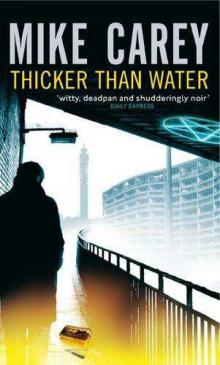 Thicker Than Water
Thicker Than Water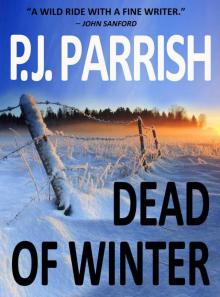 Dead of Winter
Dead of Winter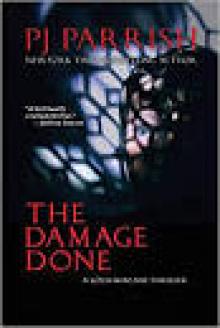 The Damage Done
The Damage Done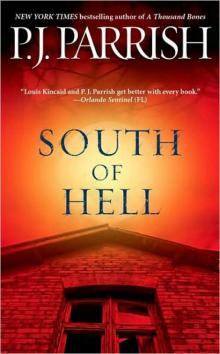 South Of Hell lk-9
South Of Hell lk-9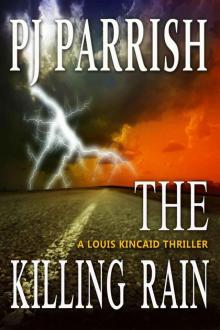 A Killing Rain
A Killing Rain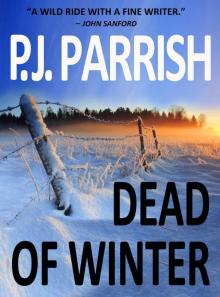 Dead of Winter lk-2
Dead of Winter lk-2 Island of Bones
Island of Bones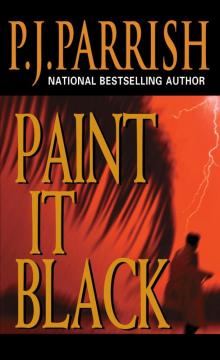 Paint It Black
Paint It Black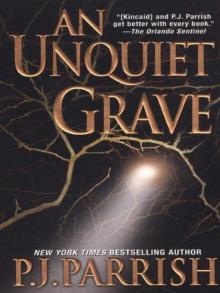 An Unquiet Grave (Louis Kincaid Mysteries)
An Unquiet Grave (Louis Kincaid Mysteries) She's Not There
She's Not There